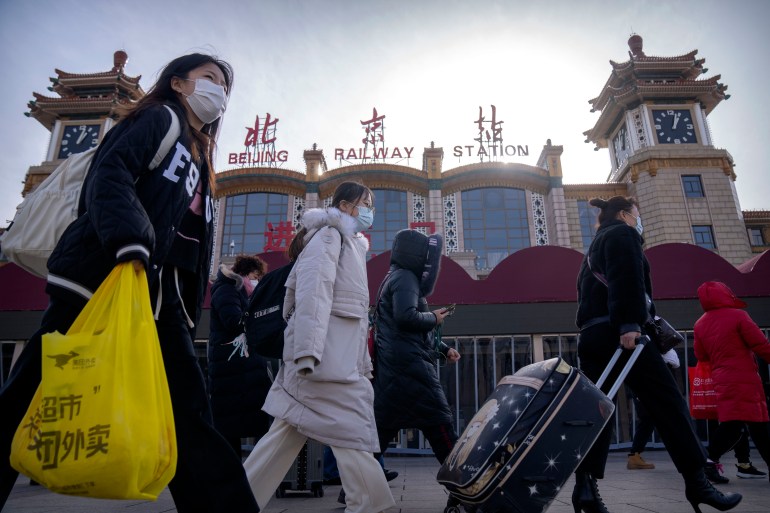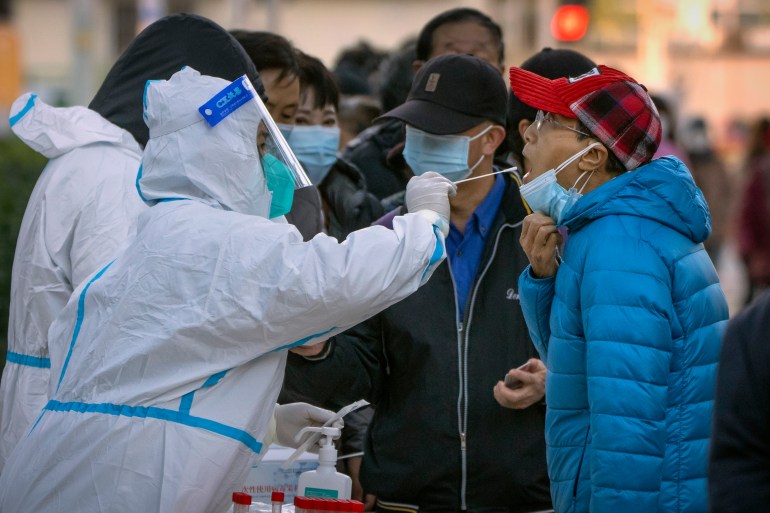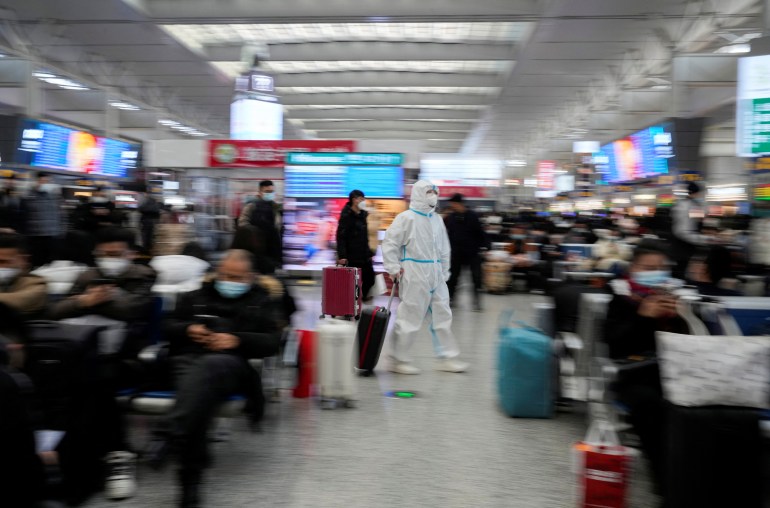‘Best thing that happened’: Chinese return home after years apart | Coronavirus pandemic News
As Vicky Liu prepared to return home to China to celebrate the Lunar New Year with her family for the first time in more than three years, she wondered how much would have changed.
“The answer is a lot,” Liu, a 25-year-old postgraduate student in the United States who is from China’s northeastern city of Qingdao, told Al Jazeera.
In this period of time, two of her grandparents had died, two cousins had got married and a third cousin had become a mother. Liu’s parents had also bought a new house, her long-distance partner had moved from Qingdao to Shanghai and her family’s pet dog, Qiqi, had died.
Liu had not been there for any of it.
She left China in August 2019, a few months before the first cases of COVID-19 emerged in the central city of Wuhan.
After claiming success in stamping out that initial outbreak, most people in China expected that measures to contain the virus, including strict lockdowns, mass testing and closed borders with weeks-long centralised quarantines for the few international arrivals, would be temporary.

Instead, the restrictions became part of President Xi Jinping’s signature zero-COVID strategy, which was only abandoned last month as it dragged on economic growth and thousands had taken to the streets in frustration at the limits on their lives.
Liu never imagined she would have to say her last goodbyes to her loved ones and attend their funerals through video calls 12 time zones away, but with China all but cut off, that is exactly what she did. In late 2021, she woke at 3am one day to bid her final farewell to her grandfather through her mum’s smartphone. She had to do the same with her grandmother a few months later.
So when China dropped nearly all pandemic control measures in a series of inscrutably abrupt policy changes over a few weeks in December, Liu and the thousands of others locked out of their homeland jumped at the chance to return.
“This is joking of course,” she giggled over the phone as she made her final landing in Beijing before hopping on a train to Qingdao. “But I can’t believe that I can actually come back to China again in my lifetime.”
Missing milestones
Liu is not alone in her elation at finally being able to hug friends and family at home in China. For many of the estimated 10 million Chinese who live overseas, this Lunar New Year – the Year of the Rabbit – will be the first time they have seen their homes and families in years.
Some, like Liu, have had to live with the crushing pain of not seeing their loved ones before their death, while others have missed key moments such as the birth of a child.
Jason Jiang left his hometown in Jiangsu province to open a Chinese restaurant in Cape Town in late 2019.
The 31-year-old had planned to return in 2020 when his wife gave birth to a baby boy but, to his dismay, the cost of a one-way flight ticket soared above $15,000 – more than what he would earn in months. Worse, because he had recently recovered from COVID he was barred from entering China under Beijing’s stringent rules on entry for those who had had the virus.
“My wife told me it was fine, but deep down, I knew it was not,” Jiang, who has only been able to see his now-two-year-old son through video calls on WeChat, the Chinese messaging platform, told Al Jazeera.

As soon as the restrictions were lifted, he booked his ticket.
On January 11, he landed at the airport in Nanjing. Jiang’s wife and son were waiting for him as he walked out of the arrivals hall.
For the first time in his life, Jiang heard in person from his son the two words that he had yearned to hear: “Baba” (Dad)! Tears streamed down his face.
Jiang was soon reminded of all he had missed. He had no idea which colour pleased his son the most, nor did he know which lullaby would soothe him.
“I know these things are small,” he said. “But they carry so much weight and not being able to be here in the past two years to see that is really painful.”
Still, reunited with his family and with the Lunar New Year only days away, Jiang says his journey home was “the best thing that happened” to him in recent years.
Three-year nightmare
In China itself, people are also looking forward to seeing their loved ones again after being told to celebrate the new year “where they are” for the past two years because of COVID-19.
This year, as the government abandons its campaign to “eradicate the virus”, billions of trips are expected to take place as part of the New Year travel rush – arguably the biggest annual human migration on earth. For many, the reunion carries an undertone of post-apocalyptic jubilance as a large proportion of the population has already contracted and recovered from the virus.
Cui Xia, a migrant worker in China’s southern city of Shenzhen, is returning home to join her family for the traditional reunion dinner on Lunar New Year Eve for the first time in two years.
“My parents are almost 70 years old, and it’s so nice to see them this year after the fear of COVID is gone,” Cui, who is from southwestern Guizhou province, told Al Jazeera.
Cui, her husband and both her parents have recently recovered from COVID-19.
“We will light up fireworks and cook a big meal to say goodbye to this past crazy year,” she said, excitedly.
Amid the relief and excitement, however, public health experts are warning about the risk of a surge in coronavirus infections in rural areas as people travel from cities to their hometowns and villages. Underdeveloped and short-staffed, medical facilities in rural areas are bracing for a further wave of fatalities.

Earlier this month, authorities said about 60,000 people had died of COVID-19 since the restrictions were lifted in early December and many think the number is probably far higher.
For Chinese people, the restrictions might have gone but the coronavirus still stalks their lives.
“The last three years felt like a nightmare and this might have been over, but who knows? COVID is still not over at least,” Liu said.

Pingback: look these up
Pingback: คาสิโนออนไลน์ sagame
Pingback: หนังใหม่พากย์ไทย
Pingback: online platform
Pingback: Cbd oil uk